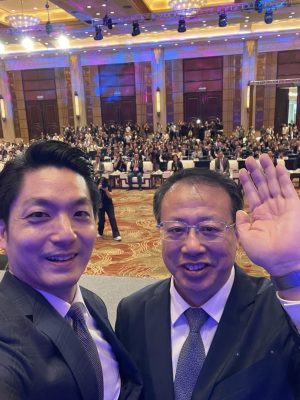The 15th Taipei-Shanghai Twin City Forum was scheduled to take place in late July or August with Taipei, Taiwan, as its host. This proposed timeframe has now come and gone. Still, no definitive plan has been announced for the annual summit that has consistently brought together the leadership of the two major cities across the Taiwan Strait for over a decade, even when broader relations between the governments of China and Taiwan have deteriorated.
The Twin City Forum has traditionally been held annually between June and August, alternating between the host cities of Taipei and Shanghai. The only exception was in 2021, during the COVID-19 pandemic, when the meeting had to be held virtually in December. The delay this year represents an anomaly.
Local media in Taiwan first reported in June that arrangements had been stalled by the Shanghai city government, speculating that the delay had to do with a spike in cross-strait tensions following the election of Taiwan’s President Lai Ching-te, whose inaugural address in May drew particular protest from Beijing.
Taipei Mayor Chiang Wan-an, who is expected to host his Shanghai counterpart during this year’s forum, has seemingly confirmed the difficulties in arranging the meeting. When asked by the media about the progress in arrangements, Chiang remarked that “the more tense cross-strait relations are, the more necessary communication is.”
Although the Twin City Forum has weathered the ups and downs of cross-strait relations over the past decade, its continuation this year will serve as a crucial indicator of the political will for future engagement across the Taiwan Strait.
The Twin City Forum was first held in 2010 under then-Taipei Mayor Hau Lung-bin of the Kuomintang (KMT). The forum aimed to enhance mutual understanding between the two peoples separated by the Taiwan Strait through city-level exchanges. This was during the Ma Ying-jeou administration, which embraced closer economic ties with China. During this period, both cross-strait and city-to-city relations progressed in the same direction, with the latter serving as an extension of the broader engagement policy.
The Twin City Forum continued under former Taipei Mayor Ko Wen-je, who was elected as an independent after the KMT’s embrace of China largely fell out of favor with the public during the Sunflower Movement in 2014. During his first trip to Shanghai as the mayor of Taipei for the 2015 Twin City Forum, Ko expressed agreement with the controversial political formula that “both sides of the Taiwan Straits are one family.” The widespread criticism Ko’s statement received in Taiwan foreshadowed a downturn in cross-strait relations under the Tsai Ing-wen administration from 2016 to 2024, even as city-level engagement persisted.
In 2023, the current mayor of Taipei, Chiang Wan-an of the KMT, attended his first Twin City Forum in Shanghai, where he oversaw the signing of 45 memoranda of understanding (MOUs) between Taipei and Shanghai. At that time, Chinese military incursions into Taiwan’s airspace and waters, along with other gray-zone activities, had not only reached new heights but had become commonplace. Despite this, Chiang’s opening speech called for “friendly city relations, friendly cross-strait relations,” redefining city-to-city interactions as a means to mitigate cross-strait tensions.
The possibility of the Twin City Forum serving a stabilizing or even reconciliatory role in cross-strait relations is now in question. If the forum fails to take place this year, it would signal further erosion of political will on both sides of the Taiwan Strait to pursue meaningful dialogue.
However, the Taipei city government remains optimistic. The Twin City Forum has spanned three mayoral administrations in Taipei and established a stable cross-strait channel for communication, albeit at the city level. This channel represents a rare opportunity for dialogue and collaboration between true equals – the governments of two major cities – when such a model has remained elusive at a higher level.
China has halted all formal high-level communication with Taiwan’s government since 2016. President Lai has repeatedly called for a resumption of dialogue “under the principles of parity and dignity.” However, this condition would necessitate Beijing’s official acknowledgment of the Republic of China (ROC), Taiwan, and Lai as its democratically elected leader – neither of which is likely to occur. Not only does Beijing’s “One China principle” reject the existence of the ROC, but it also characterizes Lai’s party, the Democratic Progressive Party (DPP), as illegitimate “separatists seeking Taiwan independence.”
The Twin City Forum offers a viable path for cross-strait dialogue. Chiang has pledged that the forum’s arrangements will be based on “the principles of parity and dignity,” aligning with Lai’s conditions for engagement. The forum not only meets those conditions but also provides a decade-long record of good-faith engagement on both sides of the Taiwan Strait.
While the topics discussed during the Twin City Forum have traditionally been confined to city-level concerns and have explicitly avoided issues of sovereignty and recognition, the forum itself signifies a sustained interest in engagement rather than confrontation from leadership on both sides.
If the Twin City Forum takes place in September or later in the year, its proceedings can be expected to follow the usual format: speeches from both mayors, a city tour of Taipei, and the signing of MOUs, which have already been drafted. If the forum does not take place at all, it should be a cause for concern.

































